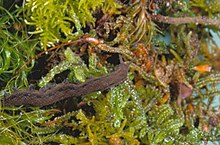| Ooperipatellus nanus | |
|---|---|

| |
|
Scientific classification
| |
| Domain: | Eukaryota |
| Kingdom: | Animalia |
| Phylum: | Onychophora |
| Family: | Peripatopsidae |
| Genus: | Ooperipatellus |
| Species: | O. nanus
|
| Binomial name | |
| Ooperipatellus nanus | |
Ooperipatellus nanus is a species of velvet worm in the family Peripatopsidae. This species is endemic to New Zealand and is found in the South Island.
Taxonomy
This species was first described by Hilke Ruhberg in 1985. [2]
Description
Ooperipatellus nanus is a small species of velvet worm that grows to a length of approximately 10 mm. [3] This species is tan or brown in color on its back but yellow on its underside. [4] It is oviparous and has 13 pairs of legs, [5] which is the minimum number found in the phylum Onychophora. [3] [6]
Distribution
Ooperipatellus nanus has only been found in Southland, in the Takitimu Mountains. [2]
Life cycle
This species produce young by laying eggs from which the young subsequently hatch. [3]
Host species
Ooperipatellus nanus are found mainly in rotting beech logs. [4]
Conservation status
This species has been classified as having the "At Risk, Naturally Uncommon" conservation status under the New Zealand Threat Classification System. [7]
References
- ^ Oliveira, I.; Hering, L. & Mayer, G. "Updated Onychophora checklist". Onychophora Website. Retrieved 24 November 2016.
- ^ a b Harris, A. C (1991). "A large aggregation of Peripatoides novaezealandiae (Hutton, 1876) (Onycophora: Peripatopsidae)". Journal of the Royal Society of New Zealand. 21 (4): 405–406. doi: 10.1080/03036758.1991.10420836.
- ^ a b c Allwood, Julia; Gleeson, Dianne; Mayer, Georg; Daniels, Savel; Beggs, Jacqueline R.; Buckley, Thomas R. (April 2010). "Support for vicariant origins of the New Zealand Onychophora". Journal of Biogeography. 37 (4): 669–681. doi: 10.1111/j.1365-2699.2009.02233.x. S2CID 55395265.
- ^ a b "Peripatus (Onchyphora)". Manaaki Whenua. Retrieved 2022-02-25.
- ^ Tait, N.N.; Briscoe, D.A. (1995-05-01). "Genetic differentiation within New Zealand Onychophora and their relationships to the Australian fauna". Zoological Journal of the Linnean Society. 114 (1): 103–113. doi: 10.1111/j.1096-3642.1995.tb00115.x. ISSN 0024-4082.
- ^ Yang, Jie; Ortega-Hernández, Javier; Gerber, Sylvain; Butterfield, Nicholas J.; Hou, Jin-bo; Lan, Tian; Zhang, Xi-guang (2015-07-14). "A superarmored lobopodian from the Cambrian of China and early disparity in the evolution of Onychophora". Proceedings of the National Academy of Sciences. 112 (28): 8678–8683. doi: 10.1073/pnas.1505596112. ISSN 0027-8424. PMC 4507230. PMID 26124122 – via ResearchGate.
-
^ Trewick, Steve; Hitchmough, Rod; Rolfe, Jeremy; Stringer, Ian (2018).
Conservation status of New Zealand Onychophora ('peripatus' or velvet worm), 2018 (PDF). 26. Department of Conservation. pp. 1–3.
ISBN
9781988514703.
{{ cite book}}:|journal=ignored ( help)
External links
| Ooperipatellus nanus | |
|---|---|

| |
|
Scientific classification
| |
| Domain: | Eukaryota |
| Kingdom: | Animalia |
| Phylum: | Onychophora |
| Family: | Peripatopsidae |
| Genus: | Ooperipatellus |
| Species: | O. nanus
|
| Binomial name | |
| Ooperipatellus nanus | |
Ooperipatellus nanus is a species of velvet worm in the family Peripatopsidae. This species is endemic to New Zealand and is found in the South Island.
Taxonomy
This species was first described by Hilke Ruhberg in 1985. [2]
Description
Ooperipatellus nanus is a small species of velvet worm that grows to a length of approximately 10 mm. [3] This species is tan or brown in color on its back but yellow on its underside. [4] It is oviparous and has 13 pairs of legs, [5] which is the minimum number found in the phylum Onychophora. [3] [6]
Distribution
Ooperipatellus nanus has only been found in Southland, in the Takitimu Mountains. [2]
Life cycle
This species produce young by laying eggs from which the young subsequently hatch. [3]
Host species
Ooperipatellus nanus are found mainly in rotting beech logs. [4]
Conservation status
This species has been classified as having the "At Risk, Naturally Uncommon" conservation status under the New Zealand Threat Classification System. [7]
References
- ^ Oliveira, I.; Hering, L. & Mayer, G. "Updated Onychophora checklist". Onychophora Website. Retrieved 24 November 2016.
- ^ a b Harris, A. C (1991). "A large aggregation of Peripatoides novaezealandiae (Hutton, 1876) (Onycophora: Peripatopsidae)". Journal of the Royal Society of New Zealand. 21 (4): 405–406. doi: 10.1080/03036758.1991.10420836.
- ^ a b c Allwood, Julia; Gleeson, Dianne; Mayer, Georg; Daniels, Savel; Beggs, Jacqueline R.; Buckley, Thomas R. (April 2010). "Support for vicariant origins of the New Zealand Onychophora". Journal of Biogeography. 37 (4): 669–681. doi: 10.1111/j.1365-2699.2009.02233.x. S2CID 55395265.
- ^ a b "Peripatus (Onchyphora)". Manaaki Whenua. Retrieved 2022-02-25.
- ^ Tait, N.N.; Briscoe, D.A. (1995-05-01). "Genetic differentiation within New Zealand Onychophora and their relationships to the Australian fauna". Zoological Journal of the Linnean Society. 114 (1): 103–113. doi: 10.1111/j.1096-3642.1995.tb00115.x. ISSN 0024-4082.
- ^ Yang, Jie; Ortega-Hernández, Javier; Gerber, Sylvain; Butterfield, Nicholas J.; Hou, Jin-bo; Lan, Tian; Zhang, Xi-guang (2015-07-14). "A superarmored lobopodian from the Cambrian of China and early disparity in the evolution of Onychophora". Proceedings of the National Academy of Sciences. 112 (28): 8678–8683. doi: 10.1073/pnas.1505596112. ISSN 0027-8424. PMC 4507230. PMID 26124122 – via ResearchGate.
-
^ Trewick, Steve; Hitchmough, Rod; Rolfe, Jeremy; Stringer, Ian (2018).
Conservation status of New Zealand Onychophora ('peripatus' or velvet worm), 2018 (PDF). 26. Department of Conservation. pp. 1–3.
ISBN
9781988514703.
{{ cite book}}:|journal=ignored ( help)
External links